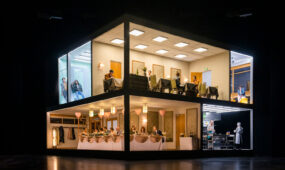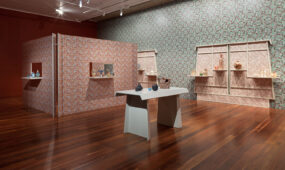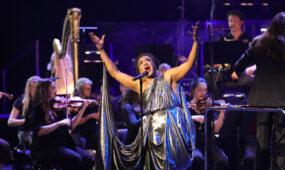Festival review: Compassion – Lior
Adelaide Festival
A string quartet was the beating heart of this Adelaide Festival chamber music highlight, which took the audience through a gamut of responses to global conflict.

The headline act was Lior Attar, the Melbourne-based Israeli-born singer-songwriter, and his Hebrew-Arabic song cycle written in collaboration with acclaimed composer Nigel Westlake.
But the common thread throughout the program was the very fine playing of the Tinalley String Quartet.
Composer Iain Grandage, who put together the chamber music program for the Festival, introduced the concert as a showcase of how different composers respond to war and division, from introspection to visceral outpouring.
The opening half began with the Tinalley String Quartet taking on the spare beauty of Estonian composer Arvo Pärt’s “Fratres” – a piece performed over the years with many different orchestrations. With the second violin taking the piece’s constant drone, the quartet began in a whisper of harmonics before building into an aching finish for the brief but powerfully meditative piece.
What came next was a treat for string quartet fans: as Grandage put it, Australia’s best three string quartets performed together – at the same time – for the first time. Tinalley was joined by the Australian String Quartet and the Goldner String Quartet, with bassist Andrew Meisel, to form an all-star chamber orchestra. Together they provided a version of Shostakovich’s Chamber Symphony Op 110a – which grew out of a piece for string quartet.
Dedicated to the “victims of fascism and the war”, the piece in the hands of these 13 players achieved both depth and a kind of pristine clarity – quite an achievement given the three distinct groups involved.
Lior took the stage in the second half, again with the hard-working Tinalley String Quartet, plus Meisel and percussionist Claire Edwardes, for a specially commissioned, cut-down version of the Compassion song cycle.
Westlake, who originally scored the piece for full-scale orchestra, has cut it back for septet, with Edwardes doing much of the work to maintain its orchestral nuance and complexity. (One small qibble: the string quartet was heavily amplified which I felt stole some of the delicacy from the performance, but I was seated in front of a speaker stack.)
The seven sections combine Islamic and Hebrew texts – all related to the theme of compassion – which reveal the commonalities between the two ancient, and often conflicted, religions (the poignancy of the project is highlighted even further by the knowledge that this work was part of Westlake’s response to the murder of his son).
With his plaintive tenor voice, Lior pours himself into the songs, which sound both ancient and new – subtle Middle Eastern runs and filagrees combined with shades of western formal traditions. From a meditative, chant-like opening, the cycle moves through more rhythmic and sonorous tones, to end with the haunting beauty of “Avinu Malkeinu” – a version of the prayer sung on the Jewish Day of Atonement.

Get InReview in your inbox – free each Saturday. Local arts and culture – covered.
Thanks for signing up to the InReview newsletter.
Faced with a standing response from the Town Hall audience, Lior and musicians produced a lovely version of his song “Safety of Distance”:
There is hope in the land of ruins
In the village of old enemies
Who have come to join hands for they share the knowledge:
Compassion is the measure of a man.
Compassion: Lior and Nigel Westlake was presented for one night only during the Adelaide Festival. Read more InDaily Adelaide Festival stories and reviews here.
Support local arts journalism
Your support will help us continue the important work of InReview in publishing free professional journalism that celebrates, interrogates and amplifies arts and culture in South Australia.
Donate Here






Comments
Show comments Hide comments